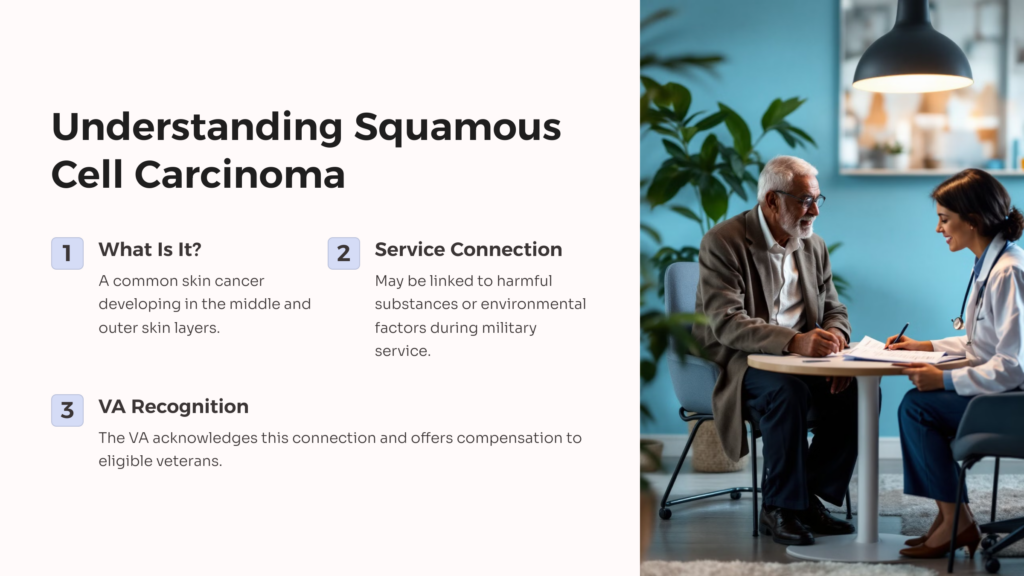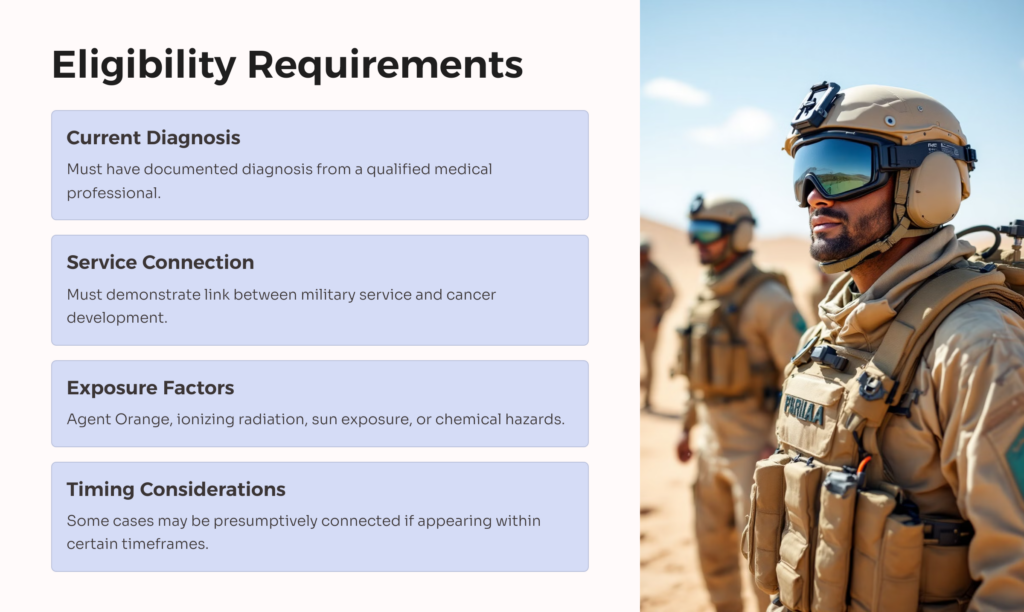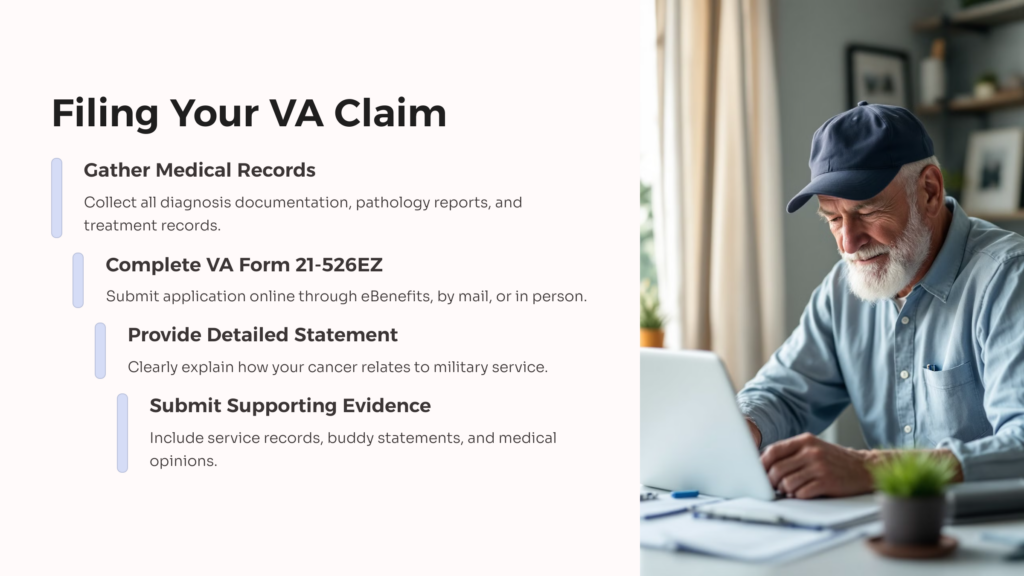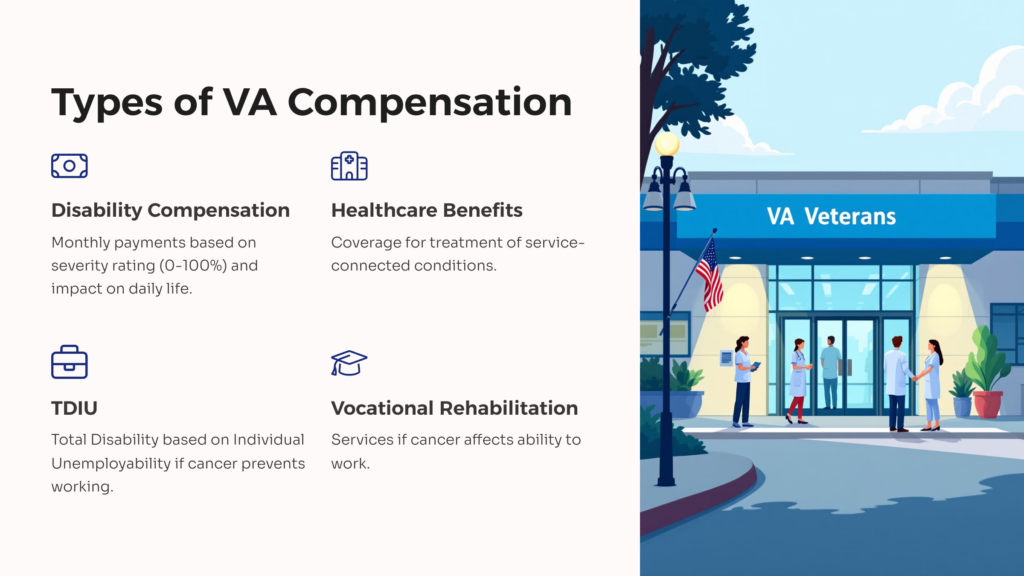Veterans who have been diagnosed with squamous cell carcinoma may be eligible for VA compensation. This type of skin cancer can be related to various forms of service-connected exposure, particularly for those who served in certain locations or during specific time periods. Understanding the process of filing a claim and the potential VA disability benefits available is crucial for affected veterans.

Squamous cell carcinoma is a common form of skin cancer that develops in the squamous cells, which make up the middle and outer layers of the skin. For veterans, this condition may be linked to exposure to harmful substances or environmental factors during their military service. The Department of Veterans Affairs (VA) recognizes this connection and offers compensation to eligible veterans.
To qualify for VA compensation, veterans must establish a service connection for their squamous cell carcinoma. This means providing evidence that the cancer was caused by or related to their military service. The VA considers factors such as exposure to Agent Orange, ionizing radiation, and other hazardous materials when evaluating claims.
Eligibility Criteria for VA Compensation

To be eligible for VA compensation for squamous cell carcinoma, veterans must meet certain criteria. First and foremost, they must have a current diagnosis of squamous cell carcinoma from a qualified medical professional. This diagnosis should be well-documented in their medical records.
Additionally, veterans need to demonstrate a connection between their military service and the development of squamous cell carcinoma. This can be done by showing that they were exposed to known risk factors during their service, such as:
- Agent Orange or other herbicides used in Vietnam and certain other locations
- Ionizing radiation from nuclear weapons testing or other sources
- Prolonged sun exposure in tropical or desert environments
- Exposure to certain chemicals or environmental hazards
The VA also considers the time frame in which the cancer developed. In some cases, squamous cell carcinoma may be presumptively service-connected if it appears within a certain period after discharge from active duty.
Filing a Claim for VA Compensation

To file a claim for VA compensation for squamous cell carcinoma, veterans should follow a specific process. The first step is to gather all relevant medical records and documentation of their diagnosis. This should include pathology reports, treatment records, and any opinions from oncologists or dermatologists regarding the potential cause of the cancer.
Next, veterans should complete and submit VA Form 21-526EZ, which is the Application for Disability Compensation and Related Compensation Benefits. This form can be submitted online through the VA’s eBenefits portal, by mail, or in person at a VA regional office.
When filling out the form, it’s important to clearly state that the claim is for squamous cell carcinoma and provide details about how it relates to military service. Including a personal statement that describes the exposure or circumstances believed to have caused the cancer can be helpful.
Veterans should also submit any supporting evidence they have, such as service records showing locations of deployment, buddy statements from fellow service members, or medical opinions linking their cancer to service-related exposures.
Types of VA Compensation Available

The VA offers several types of compensation for veterans with service-connected squamous cell carcinoma. The primary form of compensation is disability compensation, which provides monthly payments based on the severity of the condition and its impact on the veteran’s ability to work and perform daily activities.
A VA Disability rating for squamous cell carcinoma can range from 0% to 100%, depending on factors such as:
- The extent and stage of the cancer
- The effectiveness of treatment
- The presence of residual scars or disfigurement
- The impact on overall health and functioning
In addition to monthly disability payments, veterans may also be eligible for:
- Special Monthly Compensation (SMC) for severe disabilities
- Total Disability based on Individual Unemployability (TDIU) if the cancer prevents them from working
- Health care benefits for treatment of the service-connected condition
- Vocational rehabilitation services if the cancer affects their ability to work
Presumptive Service Connection for Certain Veterans
For some veterans, establishing a service connection for squamous cell carcinoma may be easier due to presumptive service connection. This means that the VA presumes certain conditions are related to military service based on known exposures or circumstances.
Veterans who served in Vietnam between January 9, 1962, and May 7, 1975, are presumed to have been exposed to Agent Orange. If they develop squamous cell carcinoma of the lung, larynx, or trachea, it may be presumptively service-connected.
Similarly, veterans who participated in radiation-risk activities, such as nuclear weapons testing or the occupation of Hiroshima and Nagasaki, may have a presumptive service connection for skin cancer, including squamous cell carcinoma.
It’s important to note that even if a veteran doesn’t qualify for presumptive service connection, they can still file a claim and provide evidence to establish a direct service connection for their squamous cell carcinoma.
Gathering Evidence to Support Your Claim
Strong evidence is crucial when filing a claim for VA compensation for squamous cell carcinoma. Veterans should gather as much documentation as possible to support their case. This may include:
- Military service records showing locations and dates of service
- Medical records documenting the diagnosis and treatment of squamous cell carcinoma
- Statements from doctors linking the cancer to military service or exposures
- Lay statements from fellow service members or family members describing observed symptoms or exposures
- Research articles or scientific studies supporting the connection between specific exposures and squamous cell carcinoma
Veterans should also consider obtaining a nexus letter from their treating physician. This is a medical opinion that explicitly connects the squamous cell carcinoma to military service. A well-written nexus letter can significantly strengthen a claim.
The VA Claims Process and Timeline
After submitting a claim for VA compensation for squamous cell carcinoma, veterans should be prepared for a potentially lengthy process. The VA aims to process claims within 125 days, but complex cases may take longer.
The typical steps in the claims process include:
- Initial review of the claim by a VA representative
- Request for additional evidence or information, if needed
- Scheduling of a Compensation and Pension (C&P) examination
- Review of all evidence by a VA rating specialist
- Decision on the claim and assignment of a disability rating
Throughout this process, veterans have the right to check on the status of their claim and provide additional evidence if necessary. If the initial claim is denied or the veteran disagrees with the assigned rating, they have the right to appeal the decision.
Additional Resources and Support
Veterans seeking compensation for squamous cell carcinoma don’t have to navigate the process alone. There are numerous resources and support services available to assist them:
- Veterans Service Organizations (VSOs) can provide free assistance with filing claims and appeals
- The VA’s website offers detailed information on disability benefits and the claims process
- Local VA medical centers often have social workers who can provide guidance and support
- Online forums and support groups for veterans with cancer can offer peer support and advice
Additionally, veterans should consider seeking legal assistance if their claim is complex or if they need to appeal a denial. Many attorneys specialize in veterans’ benefits law and can provide valuable expertise.
By understanding the process, gathering strong evidence, and utilizing available resources, veterans with squamous cell carcinoma can improve their chances of receiving the VA compensation they deserve. This support can be crucial in managing the financial and health-related challenges associated with cancer treatment and recovery.
Allow us to guide you through the process of receiving benefits you deserve. Begin today by taking our free medical evidence screening, at Allveteran.com.
 AllVeteran.com Advisors
AllVeteran.com Advisors
With expertise spanning local, state, and federal benefit programs, our team is dedicated to guiding individuals towards the perfect program tailored to their unique circumstances.











